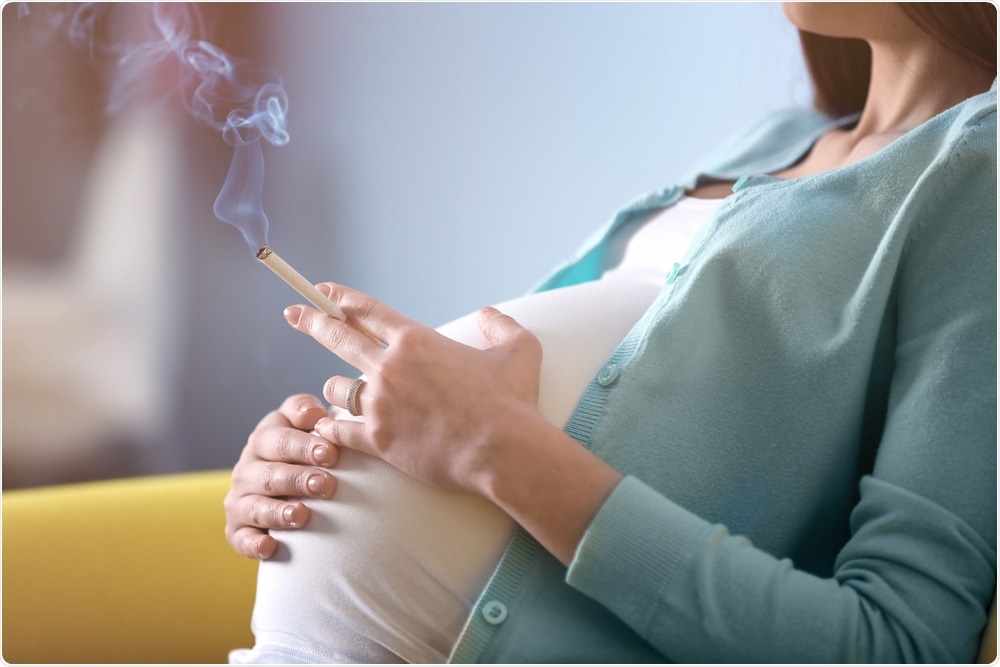Babies are 12 times more likely to suffer from Sudden Infant Death Syndrome (SIDS) if their mother continued to both drink and smoke after the first trimester of pregnancy, compared with babies born to mothers who did not.

Image Credit: Africa Studio/Shutterstock.com
Smoking together with alcohol increases the risk of SIDS
A new study published this month in the online journal EclinicalMedicine reveals that smoking and drinking after the first trimester is significant. Babies born to mothers who did not smoke or drink or smoked and drank but stopped at the first trimester had a significantly lower risk than babies born to mothers who continued to drink and smoke past the first trimester.
It has long been known that both maternal and paternal smoking habits impact the risk of a child dying from SIDS, however, this new study has revealed that the time following the first trimester is particularly significant.
Over the decades, an increasingly growing body of research has emerged, establishing evidence that parents who smoke are putting their children at an increased risk of premature death by SIDS. For many years’ doctors have warned both mothers and fathers against smoking to protect their children from the risk of SIDS.
The current study takes these findings even further, it is the first-ever large-scale study to investigate the relationship between both prenatal alcohol and tobacco exposure and the risk of SIDS. Researchers at the Avera Health Center for Pediatric & Community Research in Sioux Falls, South Dakota, determine for the first time that combined exposure to alcohol and tobacco have an interdependent effect on increasing the risk of SIDS, due to the observation that dual exposure resulted in a significantly higher risk than smoking alone.
The research
Researchers collected data on the pregnancies of women in both the US, from two American Indian Reservations in South Dakota and North Dakota, and South Africa, from two residential areas in Cape Town. Overall, the smoking habits, drinking habits, and incidence of SIDS were studied in roughly 12,000 women. These locations were chosen due to their particularly high incidence of SIDS and prenatal alcohol consumption.
The women and their children were studied for the next year after birth to determine the one-year outcomes. Researchers recorded a total of 66 children dying from SIDS during this time, and analysis revealed that these deaths were more apparent in children of mothers who both drank and smoked after the first trimester of pregnancy. These children were statistically 12 times more likely to be affected by SIDS.
Prevention of SIDS
The findings of the current study add to the already established body of evidence that has determined that both maternal and parental smoking can increase the risk of children dying from SIDS. It also increases our understanding of how smoking influences SIDS, uncovering that maternal smoking after the first trimester is more significant than smoking before this period. The findings also uncover the importance of the combination of drinking and smoking. Researchers hope that this evidence will call for stronger public health messaging to prevent mothers, and women planning to conceive, from drinking and smoking during pregnancy.
However, the study failed to consider the role of paternal smoking, which has been proven to also increase the risk of SIDS. Studies into the influence of paternal smoking on the risk of SIDS has been less focused on by research, therefore, it is necessary to also gain more data on the interaction between smoking behaviors of fathers and the risk of SIDS to develop fully effective preventative methods to keep children safe from this cause of premature death. Especially when it is considered that mothers often stop smoking while pregnant, whereas fathers are less motivated to do so.
Source:
Combined prenatal smoking and drinking greatly increases SIDS risk, https://www.eurekalert.org/emb_releases/2020-01/nioa-cps011720.php accessed 20.01.20.